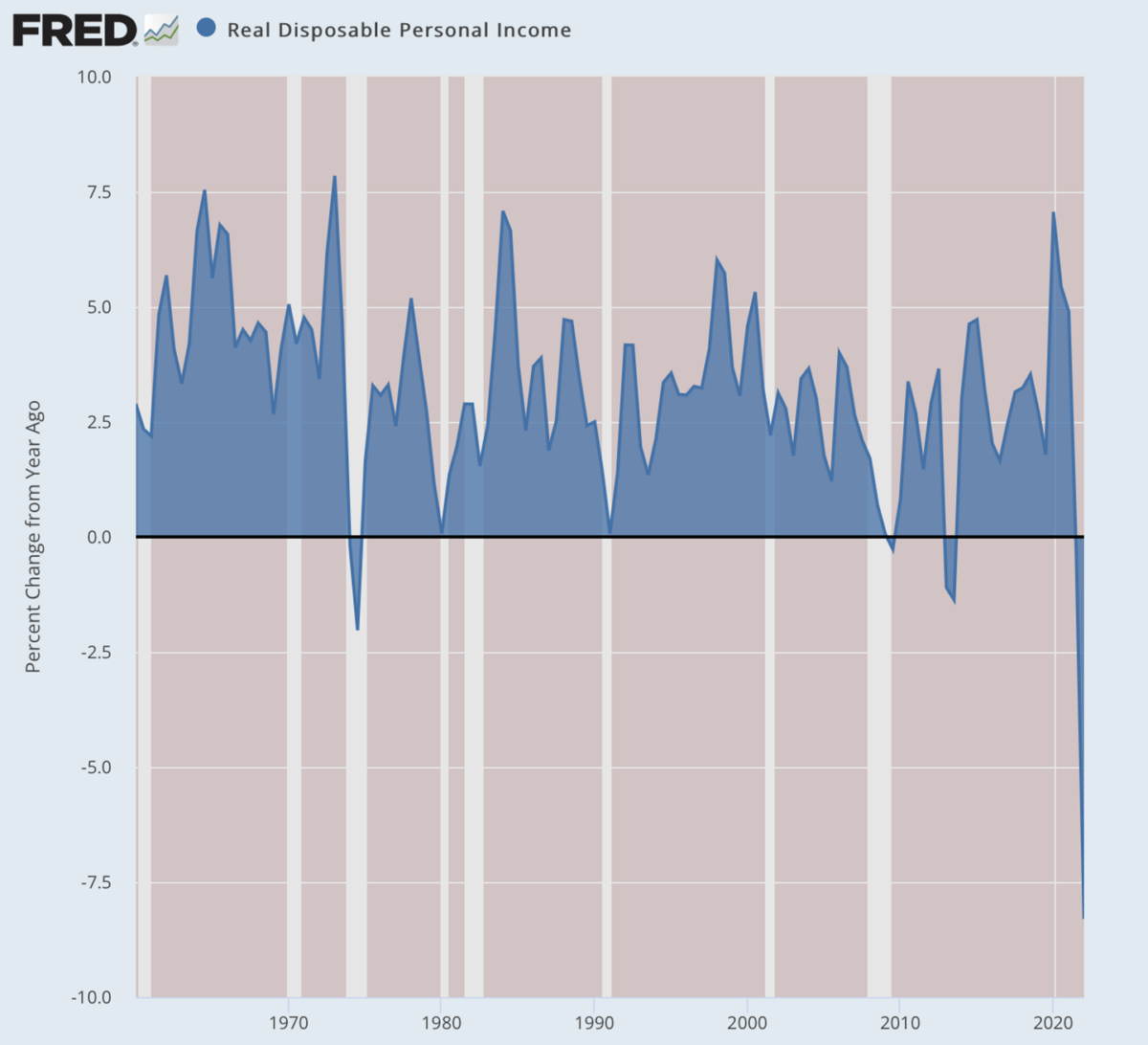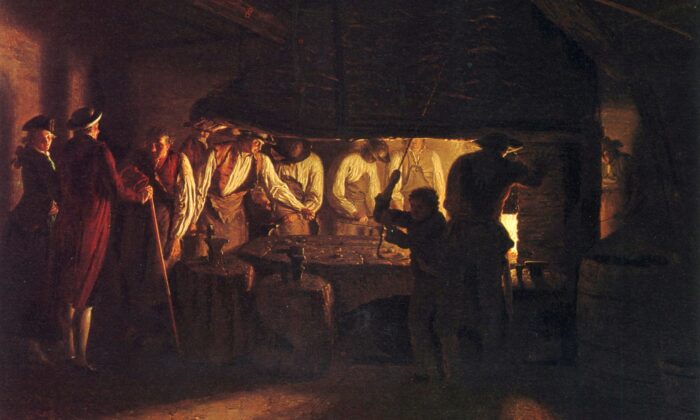Commentary
The debate about whether we are in a recession—it dominated the news over the weekend—has become a war of words with high political significance but low real-world meaning for the average person.
The real story is about what people are doing to survive the times. They are bailing on high-end groceries and raiding the discount shops. They are curtailing travel plans, running up credit-card debt, and searching for cost savings wherever they can. They are buying in bulk for fear of shortages and stuffing the excess wherever it fits. And those who choose to work are clinging to the jobs they have for fear of the future, even as large corporations are culling administrative staff just to survive.
The data on real disposable personal income tells the real story. People don’t need to wait for GDP figures. They know exactly what is going on because they feel it in their falling standard of living. Real after-tax income is down this year alone by 8.3 percent annualized. Month by month since April 2021, we’ve been in the longest period of decline in real disposable income since World War II. The value of the dollar is down 14 percent from 18 months ago but in some areas, the pain is much more intense. Energy prices are up 41 percent and groceries 12.2 percent.

I spent some time with the owner to gain a sense of the challenges. He can no longer sell the one-time speciality of this shop—barbecued goat—because getting the meat is completely unaffordable. As we talked, a goat farmer happened to show up and spoke of his own struggles in getting goats at all. Despite the high final prices he can get for the animals, the margins are getting thinner by the day and the price of feed is going through the roof. A farmer was there too and spoke of the costs of fertilizer for the feed.
This is how markets work. They are beautiful and magical when the money is sound, the supply chains are reliable, and cost accounting gives a picture of economic realities that are stable and predictable. But inflation changes everything and affects everyone. It begins to feel like survival because one never knows where the latest shock will hit. Every price increase affects every other sector.
The barbecue house can no longer afford employees because the owner has to pay so much to buy their attention and labors. So he ends up doing the cooking, the cutting, running the retail sales, and busing the tables. He expressed frustration at not being able to find employees who will work long hours, show up in a way on which he can rely, or otherwise take their jobs seriously.
I make a habit of visiting with merchants and business owners whenever I can. Overwhelmingly, the biggest problem today is finding workers. You can get hundreds of applications, only to learn that millions of people apply for jobs only to satisfy the demands of the unemployment office, which requires evidence of a job search to keep the largesse flowing.
“Everyone wants the big bucks but no one wants to work,” is a refrain I heard over and over in every industry, from accounting services to pool cleaning to bartending. The customers are lining up and the owners are ready to go but they can’t seem to engage a workforce. A talented and dedicated employee these days is rare, it seems.
Quick story about a once-quality hotel in which I stayed (I’m sparing the details of the place or name). The electronic hotel keys were malfunctioning throughout the whole place. People were lining up to get new ones made, slogging up to their rooms only to discover that it still doesn’t work, and then coming back. The on-site manager ended up moving from floor to floor to let people into their rooms.
Apparently, the machine that makes the electronic keys was broken but the hotel management could not get anyone in to fix it, at least not for a few days. The on-hold wait times for tech help for this one very expensive machine was in the hours. As a result, everyone on staff was going absolutely insane. And, naturally, they were all in a bad mood and taking it out on customers, and vice versa.
The floater in the toilet tank was getting stuck but the hotel didn’t have a plumber around, so I ended up fixing it myself. As for the swimming pool, it had to be closed because the company that tests the water for safety didn’t show up at all, for days. To keep down liabilities, the hotel had to shut the thing completely.
Faced with all these frustrations, I went to a beer joint downtown that usually has live music. For reasons no one could understand, the band didn’t show up. Nor did they let anyone know ahead of time. There was also only one person behind the counter and a long line of people waiting just to order something.
These are small stories of breakage, but I’m certain that you could tell similar ones from your town or your travels. There’s a much greater problem developing in this country aside from supply-chain breakages, which aren’t being fixed. We are experiencing ever more evidence of something much more serious and less fixable: a breakdown in the division of labor itself.
Consider the motivating force for Scottish economist Adam Smith to write “The Wealth of Nations,” published in 1776. He set out to provide a rational explanation for the most unusual phenomenon of his time: the rise in the standard of living not just of the rich and powerful but of all people. The ancient world didn’t experience this. Why was it happening now and what was causing it?
His long and detailed explanation ended up being equally beautiful and boring. He explained how people have learned to cooperate together in larger and larger enterprises by focusing on specialization. They learn one skill really well and deploy it with great expertise, while depending on others to do the same. This system of dividing up the labor gives life to the old English proverb that many hands make for light work. It also makes wealth, like a miracle.
What makes possible ever more complex deployments of such a system? Trust, property rights, contract enforcement, and the freedom to try and build without invasion from private and public acts of criminality. The result is robust and wonderful, a wealth-creating machine that benefits everyone in society.
Our times have taught us just how fragile this system truly is. Invade the rights of owners, workers, and people generally and you disturb and disrupt the complex network. You harm trust relationships. You demoralize and demotivate people. You risk prosperity itself. This is a good summary of the economics of the times today.
The recession is real, but its root cause isn’t just bad policy from the Federal Reserve; it’s also in the broader problem of the inhumane way that governments have treated people for 2 1/2 years. This isn’t just about the stock market and the sagging of 401(k)s. The breakages in basic market functioning have put everything we love at grave risk. It has coarsened the world, disrupted the process of building wealth, and caused mass disorientation and confusion. The casualty is prosperity.
I’ve told only a few small stories above but the problem is pervasive today, and you see it across the board in everything and everywhere. Whether it’s the price of gas, the absence of skilled labor, the flight delays, the wait times in tech support, the long delays in getting repair parts for anything, or the mysterious disappearance of millions of workers, all point to a profound danger that the division of labor that was hundreds of years in formation now faces an existential threat.
Meanwhile, our leaders mostly act like the dog in the meme in which the house is on fire. They say, “This is fine.” There is surely not a soul alive who genuinely believes them anymore.


No comments:
Post a Comment